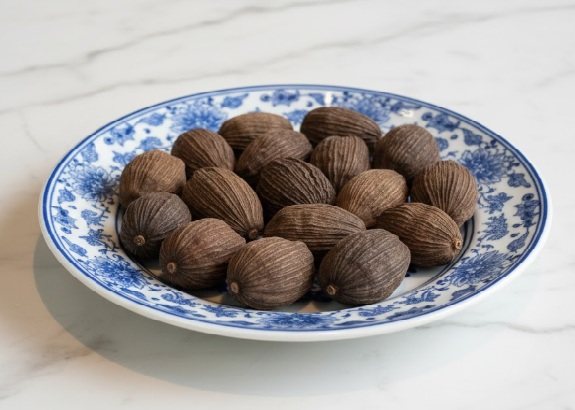Tsaoko Fruit

Tsaoko Fruit (Cao Guo): A Pungent Herb for Drying Dampness and Dispersing Cold
Introduction
Tsaoko fruit, known as Cao Guo (草果) in Traditional Chinese Medicine (TCM), is pungent and warm. It is valued for drying dampness, dispersing cold, and checking malarial disorders. Cao Guo is especially used for abdominal distention, nausea, vomiting, and malarial fevers. Its strong damp-drying and warming nature makes it a powerful remedy for cold-damp conditions of the middle burner.
What Is Tsaoko Fruit?
Cao Guo comes from the ripe fruit of Amomum tsao-ko, a perennial plant in the ginger family found in Yunnan and Southeast Asia. In TCM, it is classified as pungent and warm, entering the Spleen and Stomach meridians. Its qualities allow it to dry dampness, warm the middle, and resolve phlegm or stagnation caused by cold-damp accumulation.
Health Benefits of Tsaoko Fruit
Dries dampness and warms the middle – Relieves abdominal bloating, nausea, vomiting, and poor appetite from cold-damp obstruction.
Checks malarial disorders – Used for alternating fever and chills associated with malaria.
Transforms phlegm and reduces stagnation – Helps resolve phlegm or food retention causing fullness and discomfort.
How to Use Tsaoko Fruit
Decoction – Boiled with other herbs for cold-damp digestive issues or malaria.
Powder – Ground and combined with other herbs for stronger damp-drying action.
Culinary – Sometimes used in soups and broths to aid digestion.
Where to Buy Tsaoko Fruit
TCM shops/herbal suppliers – Commonly sold dried and whole.
Asian grocery stores – Found as a spice for culinary or medicinal use.
Look for: large, brown, ridged fruits with a strong aromatic fragrance.
Are There Any Side Effects?
Tsaoko fruit is generally safe in moderation. Overuse may damage yin or fluids due to its warm and drying nature, causing thirst or constipation.
Conclusion
Tsaoko fruit (Cao Guo) is a warm, pungent herb that powerfully dries dampness, disperses cold, and supports digestive health. Its ability to check malaria and relieve abdominal discomfort makes it an important herb in TCM for cold-damp and epidemic conditions.
FAQ
Can it help with malaria? – Yes, it is effective for alternating fever and chills.
Does it aid digestion? – Yes, it warms the middle and relieves bloating, nausea, and poor appetite.
Is it safe for daily use? – Generally safe, but avoid excess if you have yin deficiency or internal dryness.

